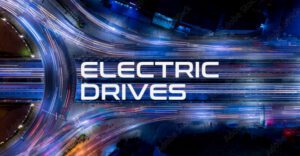- JLR pioneers portable Battery Energy Storage System (BESS) from second-life Range Rover batteries.
- Collaborative effort with Allye Energy marks the first commercial availability of a BESS using JLR battery packs.
- Each BESS, powered by seven second-life batteries, stores 270 kWh of energy, enough to fuel an average UK home for nearly a month.
JLR Unleashes On-the-Go Power with Second-Life Range Rover Batteries
JLR has partnered with innovative energy storage startup, Allye Energy, to pioneer a cutting-edge Battery Energy Storage System (BESS), enabling seamless emission-free power on the move.
One Allye MAX BESS harnesses the power of seven second-life Range Rover and Range Rover Sport PHEV battery packs, slotted into custom racks. With an impressive 270kWh capacity, it’s enough power to keep the average UK household running for nearly a month.
François Dossa, Executive Director, Strategy and Sustainability at JLR, said:
“Our Reimagine strategy is all about shifting our mindset to consider circular over linear business models. This battery innovation and partnership with Allye demonstrates the value we can create from repurposing and reusing batteries, such as from our Range Rover vehicles. We are creating new value from a used commodity that would otherwise go directly to recycling, keeping them in use for longer, and providing innovative renewable energy storage solutions.”
The groundbreaking BESS sets a new standard. It can charge up to nine Range Rover PHEVs simultaneously and seamlessly plugs into any CCS-capable Vehicle Charger, sharing the same input as JLR’s existing PHEV and BEV lineup. Its multi-input connectivity, facilitated by powerlock connections, allows for easy integration with renewable power sources, whether at fixed or off-grid locations.
The MAX BESS revolutionises power solutions by replacing diesel generators traditionally used for off-grid vehicle launches, events, and tests in remote areas – an innovation spearheaded by JLR’s Engineering team. They’re pioneers in harnessing the new BESS, ensuring zero-emission power during the testing phase of the upcoming Range Rover Electric, slated for launch later this year.
By opting for the BESS over conventional diesel generators, JLR’s Engineering team is making a significant environmental impact. With an average diesel generator consuming 16L of fuel per hour, the daily CO2 emissions tally up to 129.12kg for three hours of usage. Over 1000 testing hours, the BESS will save a staggering 15,494kg of CO2 annually – a feat equivalent to offsetting the emissions from seven round-trip flights between London and New York for a passenger.
The BESS weighs at under 3.5 tonnes, offering unmatched versatility. Whether deployed on the move or stationed in place, it serves as a robust energy storage solution for retailers or JLR sites. This empowers JLR’s extensive network of over 3000 retailers to maximise renewable energy utilisation, such as solar, while acting as vital energy buffers to facilitate fast charging in areas with limited grid connectivity. Furthermore, the unit will be commercially accessible beyond JLR, promising widespread application across various industries.
As part of its Reimagine strategy, JLR is committing £15bn to electrification, aiming to construct a robust EV ecosystem. This encompasses a holistic approach to EV batteries, reflecting JLR’s exploration of innovative circular business models in energy storage and beyond.
The BESS streamlines the development of the Range Rover Electric by facilitating prolonged endurance testing at remote off-road sites with only low-power connections. Engineers quickly top up the BESS from the limited supply during testing and then swiftly transfer power to the vehicle via fast charging, significantly accelerating the testing process.
Jonathan Carrier, CEO of Allye, said:
“Our collaboration with JLR exemplifies a shared commitment to sustainable innovation, driving us closer to a future powered by clean energy solutions. The deployment of Range Rover PHEV batteries in the MAX underscores Allye’s agnostic approach to integrating batteries from different models, of different states of health (SoH), and cell chemistries to maximize efficiency and sustainability. The Allye team is grateful to Andrew Whitworth, and Battery Business Unit team at JLR, for their commitment to closed-loop battery innovation. We are looking forward to continuing our partnership and the opportunity to give every JLR battery the chance to live a second life in energy storage.”
Battery value chains are expected to see a 30% annual growth from 2022 to 2030, projecting a staggering value surpassing $400 billion. By 2030, second-life battery supply for stationary applications is anticipated to soar above 200 gigawatt-hours annually, contributing to a global value exceeding $30 billion.
Crafted with precision to meet stringent standards, JLR’s batteries boast exceptional durability. Even after their electric vehicle service life, with a residual capacity of 70-80%, these batteries can be safely repurposed for low-energy applications. Embracing this second-life phase, JLR is committed to recycling the batteries, ensuring the recovery of raw materials for reuse, fostering a truly circular economy.
This initiative marks a significant advancement in JLR’s sustainability efforts, leveraging their collaboration with Wykes Engineering Ltd to repurpose second-life Jaguar I-PACE batteries for grid-balancing at a renewable energy park. The introduction of the BESS by Allye signifies a groundbreaking milestone for JLR, as it marks the first utilisation of full Range Rover PHEV batteries in energy storage systems. This pioneering step sets the stage for the future repurposing of Range Rover BEV batteries, showcasing their modular structure’s adaptability in fostering sustainable energy solutions.



